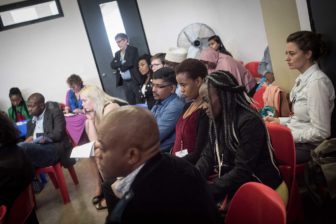
Attendees participate in a workshop on Psychological Safety for Investigative Reporting at the 10th Global Investigative Journalism Conference, Johannesburg. Photo: Daylin Paul
“I was asked to report on the rape of a three-year-old girl,” said a journalist from Nigeria.
“If the victim drowns, I need to know enough to drown with them,” said a journalist from the Philippines.
“The isiZulu word for trauma – ukuhlukumezeka – is mainly used by women, not men,” observed a third from South Africa.
Their comments, made during the “Psychological Safety for Investigative Reporting” workshop at the 2017 Global Investigative Journalism Conference in Johannesburg, reflect the complex facets of trauma faced by journalists around the globe.
“So much of what we do involves the violation of the social contract by people who abuse power,” said Bruce Shapiro, executive director at the Dart Center for Journalism and Trauma. “We need to be thinking through the trauma lens for these stories.”
The panelists emphasized the need for self-care: an often neglected consideration in the journalism profession.
Cait McMahon, psychologist at Dart Center Asia South Pacific, offered the so-called BDA approach, which provides practical tips that working journalists can implement before, during and after reporting on trauma.
Before:
Conduct a personal risk assessment. “Ask yourself: ‘Am I up for extreme exposure at the moment? Have I had a fight with my partner, am I feeling more vulnerable than usual?’ If the answer is yes, we’re not saying don’t do the story, but you need to up your self-care,” said McMahon.
Plan for the marathon. Plan breaks and how you’ll spend them — whether you’ll sleep, do yoga or run, for example.
Plan which interviews or immersive work you’ll do, and when. “Do more emotionally intensive work early, or when you feel less fatigued,” said McMahon. “Don’t look at traumatic content before bed.” Your body will send physical signals when you’re overwhelmed or stressed — are your shoulders hunched; is your fuse shorter than usual? Learn to recognize the signs, and react to them.
Identify your purpose or sense of mission. Answer the question: “Being an investigative reporter is important to me because …” The answer could change with every story, said McMahon. But when the going gets tough, “refer back to the epitaph you’ve developed for yourself.”
Grow your social support. Identify and build relationships with someone you could turn to with an ethical dilemma, or when you feel under threat or vulnerable; someone with whom you could discuss a personal issue, and someone with whom you can celebrate a job well done.
Keep physically fit. “A lot of research shows that if you’re physically fit, you will be much more mentally fit,” said McMahon.
Create ‘inoculation files.’ If you are immersing yourself in a new situation, speak to someone who has carried out a similar task and ask them what to expect. Visualize sights, sounds and smells. “Imagine yourself doing the interview and coping well,” said McMahon. File these visualizations away in your mind and access them whenever you need to.
Pre-load your phone. Arm yourself with whatever relaxes you: memes, jokes, meditation apps, cat videos, etc.
During:
Eat nutritious food, try to get enough sleep and keep exercising.
Watch for isolation. “If you find you start to isolate from your tribe … make an effort to reconnect,” said McMahon.
Deep breaths (yes, literally). When experiencing a traumatic event, try to regulate your heart rate by taking deep breaths. “If you can bring your body’s physical arousal level down, you will cope better with trauma,” said McMahon. “You can even do deep breathing with a victim.”
After:
Keep up a healthy level of exercise. “I’ve now started jogging,” said panelist Amantha Perera, who reported on conflict in Sri Lanka. “It’s made a big difference.”
Remain socially connected – be it with family, friends, through hobbies, sports clubs, community groups or church.
Take time out to rest, reflect (ask yourself what was done well, examine challenges you faced and what you could learn for next time) and replenish: do something you enjoy.
The panelists also highlighted the need for investigative journalists, who often see very little change on a macro scale, to take up hobbies outside of work where they can enjoy visible progress: become a mentor, grow a vegetable garden, or take piano lessons.
Many journalists brush off their own psychological needs by reasoning ‘it’s not about me, it’s about the victims.’ But Shapiro argues that a journalist who is deeply traumatized “is as censored as someone who has been thrown into jail,” and not performing as they should.
So the next time you’re tempted to push aside the need for self-care, said Shapiro, “stop and think: I owe it to them, I owe it to my colleagues and to press freedom to be as resilient as possible.”
 Thalia Holmes is a South African freelance journalist specializing in business, health and long-form feature writing. She has won various national awards for her work. Previously she worked at the Mail & Guardian as a business reporter, and was a management consultant in a former life before finding her passion in media.
Thalia Holmes is a South African freelance journalist specializing in business, health and long-form feature writing. She has won various national awards for her work. Previously she worked at the Mail & Guardian as a business reporter, and was a management consultant in a former life before finding her passion in media.
